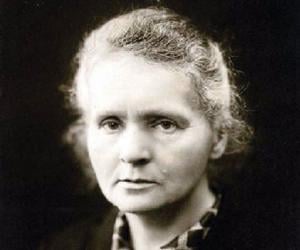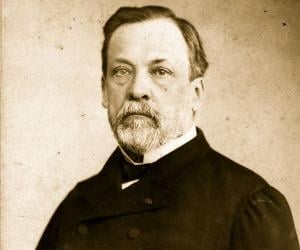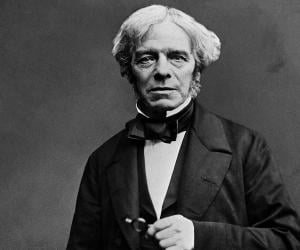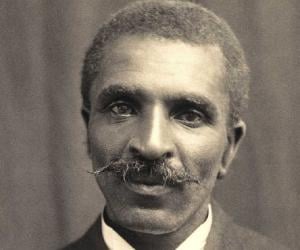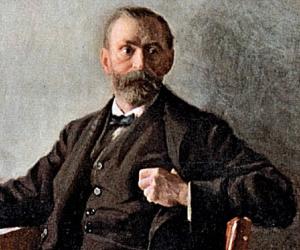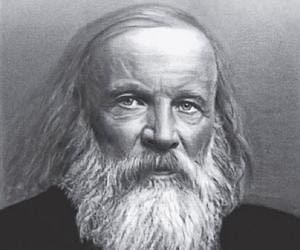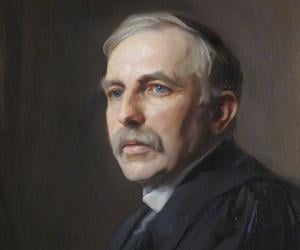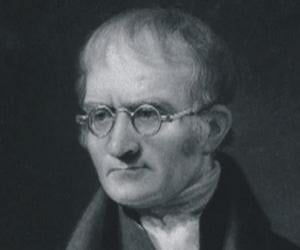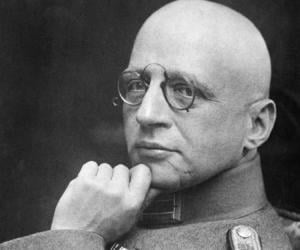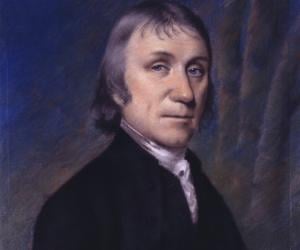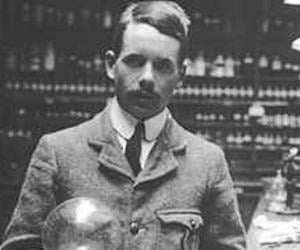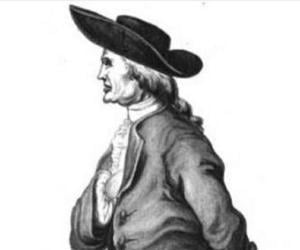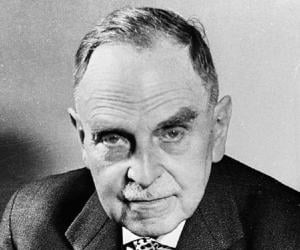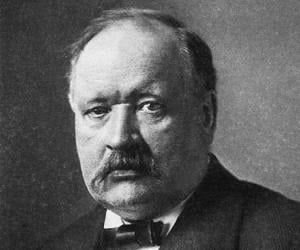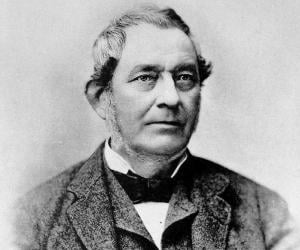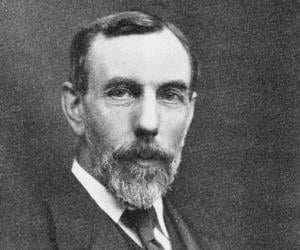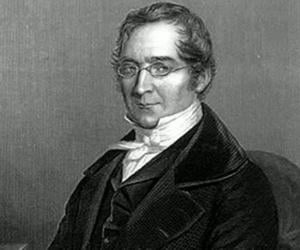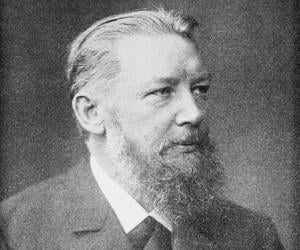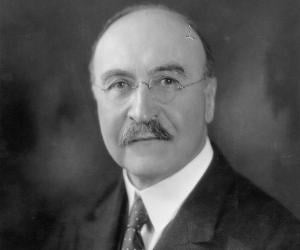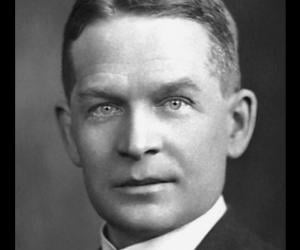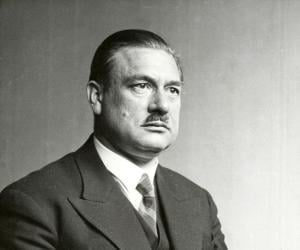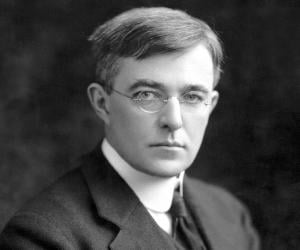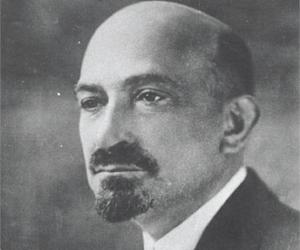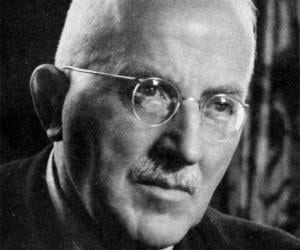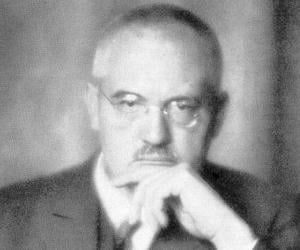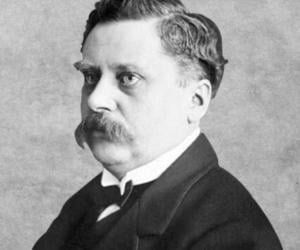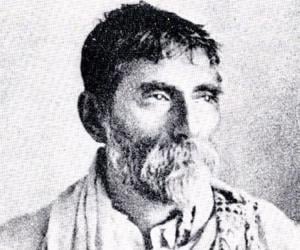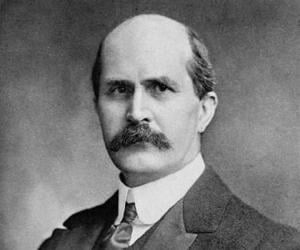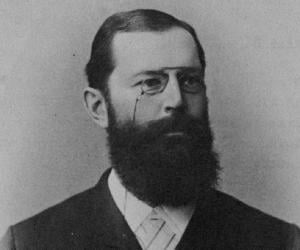Michael Faraday was an English scientist known for his contribution to the study of electrochemistry and electromagnetism. Considered one of the most influential scientists ever, Faraday's inventions of electromagnetic rotary devices established the basis for electric motor technology. His research also helped understand the concept of the electromagnetic field. Ernest Rutherford called him one of the greatest scientific discoverers ever.
Alfred Nobel was a Swedish chemist, engineer, and inventor. A prolific inventor, he held 355 different patents. Most popular as the inventor of dynamite, he was concerned with how he would be remembered after his death and bequeathed his fortune to the Nobel Prize institution. A wide traveler, he was proficient in several languages.
New Zealand physicist Ernest Rutherford is remembered as the father of nuclear physics. His discovery of radioactive half-life and of radon, and his differentiation of alpha and beta radiation, won him the Nobel Prize in Chemistry in 1908. Element 104 was named rutherfordium in his honor.
John Dalton was an English chemist, physicist, and meteorologist most famous for introducing the atomic theory into chemistry. He also contributed a lot to the study of color blindness, sometimes referred to as Daltonism in his honor. He was the first scientist to refer to the smallest particle of matter as an “atom.” He was a Quaker and lived modestly.
Fritz Haber was a German chemist who was honored with the prestigious Nobel Prize in Chemistry for inventing the Haber-Bosch process. The process is used widely to synthesize ammonia from hydrogen gas and nitrogen gas. For his pioneering work in weaponizing poisonous gases like chlorine during World War I, Haber is referred to as the father of chemical warfare.
Best remembered for his contribution to the chemistry of gases, Joseph Priestley was an English scientist, clergyman, political theorist and educator, who has been credited with discovering oxygen independently, publishing his findings before Carl Wilhelm could. A prolific writer, he has authored 150 works on various subjects including electricity. He also contributed immensely to the advancement of political and religious thoughts.
Henry Moseley was an English physicist best known for his development of Moseley's law in X-ray spectra. He made major contributions to the fields of atomic physics, nuclear physics, and quantum physics. He was working at the University of Oxford when World War I broke out, following which he went to volunteer for the Royal Engineers of the British Army.
English natural philosopher, scientist, and a prominent experimental and theoretical physicist and chemist Henry Cavendish is best-remembered for his discovery of hydrogen and his Cavendish experiment. He first recognized that hydrogen, which he termed inflammable air, is a discrete substance which produces water on combustion. He conducted the Cavendish experiment to measure and produce a value for Earth’s density.
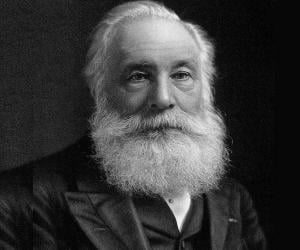
William Henry Perkin is best remembered for his chance discovery of the dye mauveine, made of aniline purple. He had apparently discovered the dye while attempting to synthesize quinine. The Royal Medal-winning British chemist also studied salicyl alcohol and flavoring agents and synthesized the first artificial perfume.
Svante Arrhenius was a Swedish scientist who became the first Swedish person to win a Nobel Prize when he won the Nobel Prize for Chemistry in 1903. Although he was originally a physicist, Arrhenius is widely accepted as a chemist and is best remembered for co-founding physical chemistry. Stockholm University houses the Arrhenius Labs, which is named in his honor.
Chemist Robert Bunsen paved the path for spectrum analysis with his discovery that every element emits a light of a particular wavelength. He also co-developed and lent his name to the Bunsen burner. He almost died of arsenic poisoning and lost sight in his right eye in a laboratory explosion.
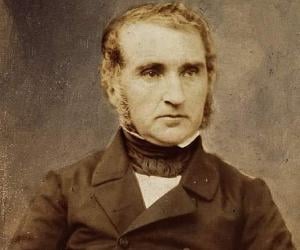
German chemist Justus von Liebig is best known for his research on organic compounds and his contribution to biochemistry and agriculture. The Copley Medal-winning scientist initially studied pharmacy but later switched to chemistry. As a professor, he stressed on laboratory-based teaching of chemistry and separating it from pharmacy, opposing traditional methods.
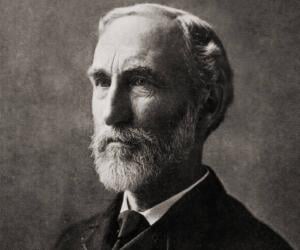
Josiah Willard Gibbs was an American scientist best remembered for making major theoretical contributions to mathematics, physics, and chemistry. As a mathematician, Gibbs is credited with inventing modern vector calculus. In 1901, he was honored with the prestigious Copley Medal for his contributions. Josiah Willard Gibbs's work had a major influence on physicists like J. D. van der Waals.
The son of a civil engineer, Nobel Prize-winning Scottish chemist William Ramsay revolutionized science with his pathbreaking discovery of the noble gases, thus forming an entirely new segment of the periodic table. He is also remembered for his long association with UCL. He was knighted for his achievements.
Known for his pathbreaking Gay-Lussac's Law, French chemist-physicist Joseph Louis Gay-Lussac was also the first, along with his colleague Alexander von Humboldt, to discover that water is composed of one part of oxygen and two parts of hydrogen. His name is one of the 72 that adorn the Eiffel Tower.

August Kekulé was a German organic chemist. Regarded as one of the most important chemists in Europe, Kekulé is credited with founding the theory of chemical structure, including the Kekulé structure of benzene. Kekulé is also credited with teaching future Nobel Prize winners, Jacobus Henricus van 't Hoff Jr., Hermann Emil Louis Fischer, and Johann Friedrich Wilhelm Adolf von Baeyer.
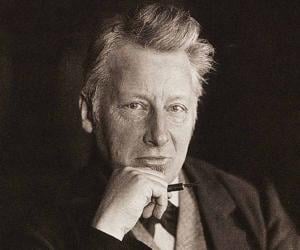
Jacobus Henricus van 't Hoff was a Dutch physical chemist best remembered for winning the first Nobel Prize in Chemistry. Van 't Hoff's work helped found the modern theory of chemical thermodynamics, chemical kinetics, chemical equilibrium, and chemical affinity. A highly popular theoretical chemist, Van 't Hoff is also counted among the founders of physical chemistry.
Wilhelm Ostwald was a Baltic German philosopher and chemist who is credited with co-founding the field of physical chemistry. A polymath, Ostwald made significant contributions to philosophy, art, and politics, especially after his retirement from academic life. His contributions to the fields of reaction velocities, chemical equilibria, and catalysis earned him the 1909 Nobel Prize in Chemistry.
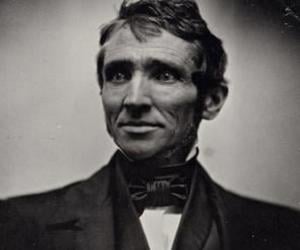
Charles Goodyear was an American manufacturing engineer and self-taught chemist who developed vulcanized rubber. He invented the chemical process to manufacture pliable, moldable, and waterproof rubber which revolutionized the automobile industry. In 1976, Charles Goodyear was inducted posthumously into the National Inventors Hall of Fame.
Industrial chemist Leo Baekeland is remembered as The Father of the Plastics Industry for creating Bakelite, the first synthetic plastic of the world, thus marking the beginning of the Polymer Age. His many inventions include Velox, a special photographic paper, the rights of which he sold to George Eastman.
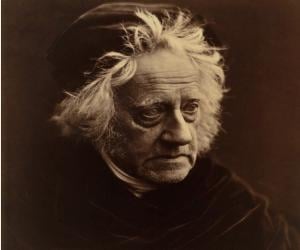
The son of renowned astronomer William Herschel, John Herschel was educated at Eton and Cambridge and grew up to be a polymath. Apart from contributing to the field of photography, he was known for cataloguing and naming stars and satellites. He briefly also served as the Master of the Royal Mint.
Peter Debye was a Dutch-American physical chemist and physicist. He is best remembered for winning the 1936 Nobel Prize in Chemistry. He was also the recipient of the Rumford Medal, Franklin Medal, and Priestley Medal. In 1965, Peter Debye was honored with the National Medal of Science. In 1982, he was inducted into the Alpha Chi Sigma Hall of Fame.
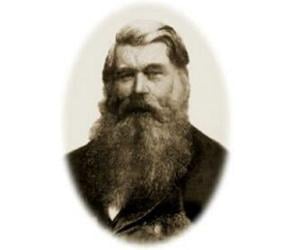
Joseph Swan was an English chemist, physicist, and inventor known for being an independent early developer of a successful incandescent light bulb. He developed and supplied the first batch of incandescent lights used for illuminating houses and public buildings. He was elected a Fellow of the Royal Society (FRS) in 1894 and knighted by King Edward VII in 1904.
Irving Langmuir was an American physicist, chemist, and engineer. He is credited with popularizing the concentric theory of atomic structure. Irving Langmuir is also credited with inventing the hydrogen welding technique and the gas-filled incandescent lamp. In 1932, Langmuir won the Nobel Prize in Chemistry for his contribution to surface chemistry. He also won other prestigious awards like Faraday Medal.
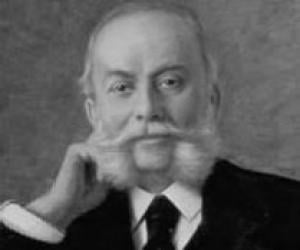
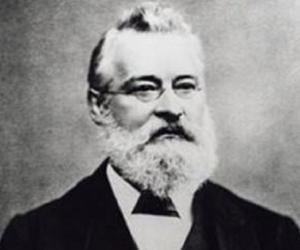
Best remembered for his work on the periodic table and his law of octaves, British chemist John Newlands, was home-schooled as a kid. A significant figure in analytical chemistry, he later won the Davy Medal for his achievements. His studied were later collated in On the Discovery of the Periodic Law.
Born in Russia, biochemist Chaim Weizmann was a World Zionist Organization leader and later also became the first president of Israel. He had a major role in the Balfour Declaration. Remembered for his research on industrial fermentation, gasoline, and rubber, he also helped establish the Weizmann Institute.
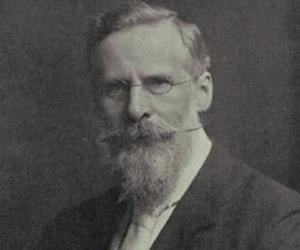
William Crookes was a British chemist and physicist remembered as a pioneer of vacuum tubes. He was the inventor of what became known as the Crookes tube. He is also credited with the discovery of the element thallium. He was the first person to describe the spectrum of terrestrial helium. He was interested in spiritualism and occultism as well.
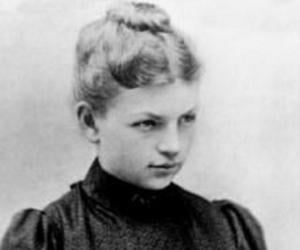
Clara Immerwahr was a German chemist who became the first German woman to receive a doctorate in chemistry. Apart from being a chemist, Clara Immerwahr was also a pacifist and a women's rights activist. Her work, marriage with the popular chemist Fritz Haber, and her suicide at the age of 44 have inspired films, novels, and TV series.
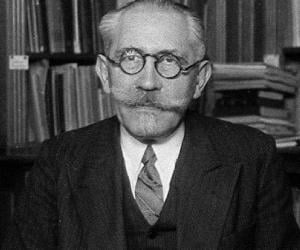
Best known for developing the Langevin dynamics and the Langevin equation, physicist Paul Langevin was also a staunch Communist. Having worked on his doctoral thesis under Pierre Curie, he had formed a connection with Curie’s wife, Marie Curie, which developed into a full-blown love affair after Pierre’s death.
Hermann Staudinger was a German organic chemist whose demonstration of the existence of polymers earned him the prestigious Nobel Prize in Chemistry in 1953. He also played a key role in the development of pyrethroid insecticides as he was able to explain clearly the molecular structures of pyrethrin I and pyrethrin II. Hermann Staudinger is also credited with discovering ketenes.
Carl Bosch was a German engineer and chemist. He is credited with founding IG Farben, which went on to become one of the largest chemical companies in the world. He is also credited with developing the Haber–Bosch process, which is used even today for the production of ammonia. Carl Bosch was awarded the Nobel Prize in Chemistry in 1931.
Alfred Werner was a Swiss chemist who is credited with developing the fundamental for modern coordination chemistry. In 1913, he became the first inorganic chemist to receive the prestigious Nobel Prize in Chemistry, which he won for proposing the correct configuration of transition metal complexes.
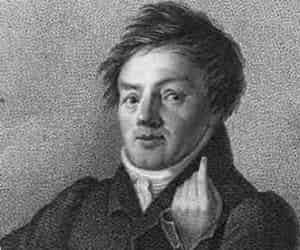
German chemist Johann Wolfgang Döbereiner was born amid poverty but managed to get training as an apothecary. After his university education, he taught at the University of Jena. His discovery of the fact that certain chemical elements were similar later led to the development of the periodic law of chemistry.
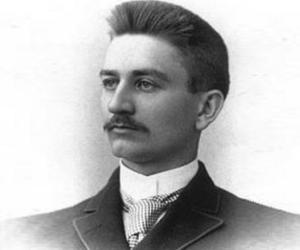
Herbert Henry Dow taught chemistry before venturing into a business career. Though his first company was a failure, his work impressed investors, and he was soon able to establish Dow Chemical, which supplied low-cost bromine to the US markets. He later made auto pistons out of spare magnesium.
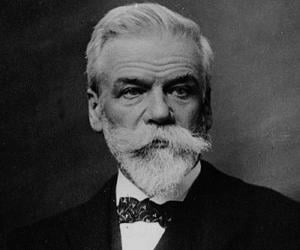
Belgian chemist Ernest Solvay began working in his family’s salt-making business soon after finishing school, as his condition of acute pleurisy prevented him from studying any further. He is remembered for developing the ammonia-soda process that produces soda ash, which is crucial to the glass and soap industries.
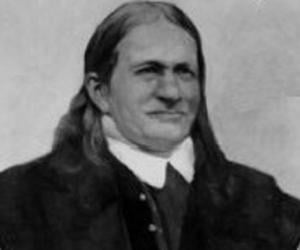
Friedlieb Ferdinand Runge was a German analytical chemist best remembered for identifying caffeine. He is also credited with identifying the mydriatic effects of belladonna extract and discovering the first coal tar dye. Friedlieb Ferdinand Runge was also the first person to observe the phenomenon of Liesegang rings in 1855.
Indian Bengali chemist Prafulla Chandra Ray founded the country’s first pharma company, Bengal Chemicals. Educated in Calcutta and Edinburgh, he later worked from his home, a room on the first floor of the college where he taught. Knighted for his achievements, he donated generous sums to the Brahmo Samaj initiatives.
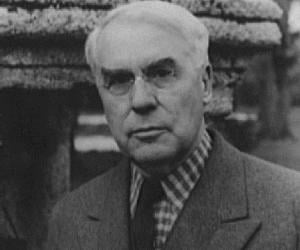
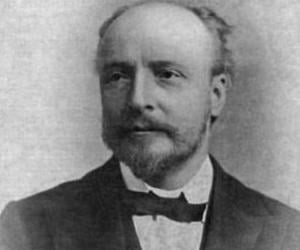
James Dewar was a British chemist and physicist best known for his invention of the vacuum flask. He conducted considerable research into the liquefaction of gases and atomic and molecular spectroscopy. He also wrote papers on the qualities of hydrogen and organic chemistry. He was awarded the Albert Medal of the Royal Society of Arts and the Rumford Medal.
William Henry Bragg was an English physicist, chemist, and mathematician. He is best known for sharing the 1915 Nobel Prize in Physics with his son Lawrence Bragg for their work in the analysis of crystal structure by means of X-rays. William Henry Bragg had an illustrious academic career and was elected president of the Royal Society in 1935.
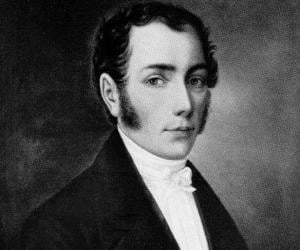
Joseph von Fraunhofer was a Bavarian optical lens manufacturer and physicist. He is credited with developing diffraction grating and inventing the spectroscope. He is also credited with discovering the Fraunhofer lines, the dark absorption lines produced in the spectrum of the sun. The Fraunhofer Society, Europe's biggest Society for the Advancement of Applied Research, is named in his honor.
Hermann Emil Fischer was a German chemist who won the Nobel Prize in Chemistry in 1902. He is credited with discovering the Fischer esterification, which is named in his honor. He is also credited with developing the Fischer projection, which was originally used for the depiction of carbohydrates. Several chemical reactions and concepts like Fischer glycosidation are named after him.
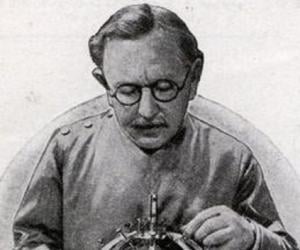
Known for his pioneering contribution to the make-up industry in Hollywood and for his revolutionary products such as Supreme Greasepaint, Max Factor Sr. was a Polish Jew, who moved to the US in the early 1900s. He founded his own brand of cosmetics, popularized the word “make-up,” and won an honorary Academy Award.
